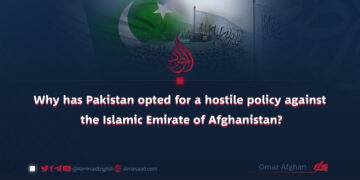Author: Hisham Shaheed
Following the fall of the Ottoman Caliphate, the Islamic world became fragmented, with each part falling under the control of foreign occupiers. The region now known as modern-day Syria was occupied by France, with all its affairs being directed by the French government of that era. This occupation persisted for nearly two decades.
In the aftermath of World War II, France, along with other nations, found itself in a weakened state and could no longer exert control over its occupied territories. Therefore, in 1946, Syria took the opportunity to declare its independence. However, the nation faced instability, due to a lack of centralized governance and internal discord.
In 1958, Syria unified with Egypt under the leadership of Gamal Abdel Nasser Hussein. Nevertheless, this unity was short-lived, and Syria regained its independence in 1961. Subsequently, in 1963, communism gained momentum, and the Ba’ath Party rose to power. The Ba’ath Party, inspired by communism, operated in both Iraq and Syria, similar to the Khalq and Parcham factions in Afghanistan.
In 1970, the rule of the Ba’ath Party continued, with Hafez al-Assad assuming the presidency. He remained in power until his passing in 2000. Following his demise, his son Bashar al-Assad took over leadership and remains in office to this day. Bashar al-Assad, a Shia communist, enjoys substantial support from Russia and Iran.
Syria, historically known as the cradle of civilizations, has experienced a century marked by atheism and a lack of proper governance. It serves as a cornerstone for numerous ancient civilizations.
The emergence of Al-Qaeda redirected focus to this region. In 2017, Abu Muhammad al-Joulani established a group of mujahideen called Tahrir al-Sham, dedicated to Syria’s independence, incorporating members of Jabhat al-Nusra.
Over the past seven years, this group has made significant strides. It has shielded Syria from the influence of Iran and Russia, eliminated extremist factions such as ISIS, and restored leadership to the broader mujahideen movement.
After preparation and planning, the group launched “Rad’ al-Adwan” (Repelling the Aggressors), a military campaign against occupiers. These operations have proved highly effective, resulting in the significant capture of territories from Bashar al-Assad’s militias. Insha’Allah, they are poised to assume complete control over Syrian lands in the near future.
The entire Ummah holds optimism and hope regarding these series of triumphs. The establishment of an Islamic system in Syria is expected to bring transformative changes across the Middle East. The success of this group of mujahideen will likely strengthen the spirit of jihad and independence in other Muslim countries as well.



















































